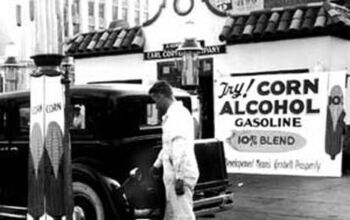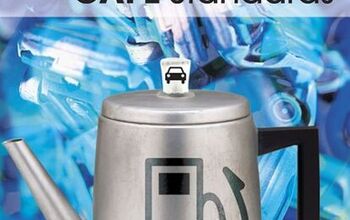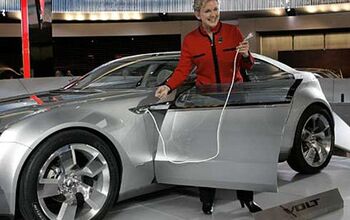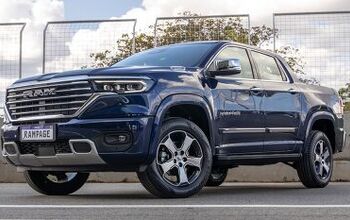The CAFE Klatsch Must Die
Americans never demanded whale blubber. They simply wanted to light their homes. When a better means to the same end came along– a cheaper, safer and more effective energy delivery system (that didn’t require long, dangerous voyages and a Hellish rendering process)- they said ‘pardon me, be right back,’ and never returned. By the same token, Americans don’t demand imported oil or inefficient cars. They want a certain standard of performance. The two concepts just happened to be joined at the hip– at the moment. But that needn’t be so.
Many critics of America’s vehicular efficiency call for a gas tax to “force” the free market to create more efficient cars and trucks. The truth is a hefty gas tax will never pass. Besides, our federal Corporate Average Fuel Economy (CAFE) standards are a perfectly adequate instrument to stimulate a relatively painless increase in our automotive efficiency. If this system was properly implemented, every car, van and truck in America would get better gas mileage. We know this because we can already see its effects: hybrids, eight speed transmissions, composite materials, Canada goose-like drag coefficients. This process could easily be accelerated simply by raising the CAFE standards.
Could automotive engineers meet the challenge of more demanding regulations? Consider Formula One. Year after year, the sport’s regulating body attempts to slow things down using restrictive legislation. Year after year, F1 teams create cars that perform at the brink of human endurance. To say ingenuity can’t lead to more fuel-efficient cars, trucks, vans and sports cars is to say science is played out and we know all there is to know. The principle that CAFE necessity is the mother of invention remains fundamentally sound. Ah, but there is a caveat; raising CAFE standards is not enough. The rules are fundamentally flawed.
First, the legislation should be amended to stop assigning higher fuel economy ratings to flexible-fuel vehicles. For example, CAFE regs rate an E85-compatible 5.3-liter V8 Chevy Tahoe at 33mpg. The vehicle’s “gas only” EPA rating is 15/19mpg. The SUV struggles to achieve 10mpg on E85– which is more or less completely unavailable to 90% of the US population. Oh, and that’s one of the reasons why GM can advertise the fact that so many of their vehicles get “over 30mpg.” The CAFE regulation’s E85 calculations are ridiculous on so many levels it hurts.
Second, the EPA mpg figures should reflect actual real world driving. A Toyota Prius does not get 60mpg in city driving or 51mpg on the highway, and should not receive CAFE credits for doing so in the theoretical realm. While new EPA regulations will supposedly lower mileage estimates on hybrids by roughly 30%, and reduce a lot of other overly-optimistic estimates, it’s been clear for quite some time that the EPA should be using real world data. What’s more, the agency should create one simple statistical average for both city and highway driving.
Third, the loophole whereby passenger vehicles get called trucks or light trucks– removing some of the worst CAFE offenders from manufacturers’ car fleets and subjecting them to lower truck-related mpg standards– must be cinched. Classifying the PT Cruiser as a truck because it has a removable rear seat is just wrong. Classifying a crossover a truck because it has greater cargo-carrying capacity than passenger-carrying volume is also unacceptable. Common sense– rather than weights and measures– should be applied. If we’re really serious about improving overall fuel efficiency, it’s time for pickup trucks to be classified as passenger vehicles, regardless of their weight or commercial use.
Fourthly, the whole system of CAFE “credits” should be eliminated. Specifically, when a manufacturers’ car or light truck fleet’s average fuel economy exceeds the required standard, they earn credits that can be applied to any three consecutive model years prior to (“carry back”) or subsequent to (“carry forward”) the model year in which the credits are earned. Why do we need to dangle a carrot in front of automobile manufacturers? On the stick side, the penalties for non-compliance must be raised to the point where companies like BMW can’t simply shrug them off as a cost of doing business.
Lastly, again, CAFE standards should be raised. A manufacturer’s passenger car fleet is currently required to average 27.5mpg; light trucks must average 21.6 (rising to 22.2 mpg for 2007). I suggest a relatively modest increase of 2% a year for the next ten years.
Repealing the laws of supply and demand is challenging. If cars use less gas, supply rises, prices drop and the airline and trucking industries gobble up what good CAFE achieved. Everyone needs to be in the same boat, because consumption is – forgive me – a whale of a problem. Transportation is responsible for nearly 70% of the world’s oil use. The captains of that industry should be charged with changing course.
More by Michael Martineck
Latest Car Reviews
Read moreLatest Product Reviews
Read moreRecent Comments
- Jkross22 Their bet to just buy an existing platform from GM rather than build it from the ground up seems like a smart move. Building an infrastructure for EVs at this point doesn't seem like a wise choice. Perhaps they'll slow walk the development hoping that the tides change over the next 5 years. They'll probably need a longer time horizon than that.
- Lou_BC Hard pass
- TheEndlessEnigma These cars were bought and hooned. This is a bomb waiting to go off in an owner's driveway.
- Kwik_Shift_Pro4X Thankfully I don't have to deal with GDI issues in my Frontier. These cleaners should do well for me if I win.
- Theflyersfan Serious answer time...Honda used to stand for excellence in auto engineering. Their first main claim to fame was the CVCC (we don't need a catalytic converter!) engine and it sent from there. Their suspensions, their VTEC engines, slick manual transmissions, even a stowing minivan seat, all theirs. But I think they've been coasting a bit lately. Yes, the Civic Type-R has a powerful small engine, but the Honda of old would have found a way to get more revs out of it and make it feel like an i-VTEC engine of old instead of any old turbo engine that can be found in a multitude of performance small cars. Their 1.5L turbo-4...well...have they ever figured out the oil dilution problems? Very un-Honda-like. Paint issues that still linger. Cheaper feeling interior trim. All things that fly in the face of what Honda once was. The only thing that they seem to have kept have been the sales staff that treat you with utter contempt for daring to walk into their inner sanctum and wanting a deal on something that isn't a bare-bones CR-V. So Honda, beat the rest of your Japanese and Korean rivals, and plug-in hybridize everything. If you want a relatively (in an engineering way) easy way to get ahead of the curve, raise the CAFE score, and have a major point to advertise, and be able to sell to those who can't plug in easily, sell them on something that will get, for example, 35% better mileage, plug in when you get a chance, and drives like a Honda. Bring back some of the engineering skills that Honda once stood for. And then start introducing a portfolio of EVs once people are more comfortable with the idea of plugging in. People seeing that they can easily use an EV for their daily errands with the gas engine never starting will eventually sell them on a future EV because that range anxiety will be lessened. The all EV leap is still a bridge too far, especially as recent sales numbers have shown. Baby steps. That's how you win people over.


































Comments
Join the conversation
thx: 1. You may very well be right. It just so happens that our political discourse seems to revolve almost entirely around CAFE (for good or ill). 2. I don't see this as an either/or proposition. I'm merely rejecting the contention by some that the Big 2.5's dependence upon big SUVs/trucks represented the only rational response to shifting buyer desires. 3. The issue isn't that Detroit offered big SUVs per se -- it is that they bet the farm on them. That strategy was not sustainable for a variety of factors, e.g., it was only a matter of time before oil prices rose again. A reasonable risk analysis would have resulted in a more balanced product mix. As for legacy costs, I don't think those are a good excuse for Detroit's myopic behavior. Pioneers of new market niches will tend to generate higher profit margins than those who are reactive. Alas, the Big 2.5 tended to focus its innovative energies on big SUVs. Meanwhile, the imports got a head start on carving up the lucrative crossover market. 4. One can look at the Tundra in a number of different ways. For example, one might argue that Toyota didn't do a very good job in marketing the "mid-sized" Tundra's (mediocre) efficiency advantages . . . and that its market potential would have increased along with gas prices. At any rate, sometimes it takes a while for a category buster to gain popularity. Recall that the original VW Beetle was not a hot commodity in its early years. I'll stick my neck out and predict that Toyota's late entrance into the big truck market could turn out to be its first major mistake. It's a good thing that Toyota has deep pockets, because that automaker may have trouble recovering its enormous investment.
"Extract 25K BTU’s out of 75K Ethanol or 125K Gasoline. The result is the same." Yes... Exactly the same... Except for the corrovise effects of ethanol, the greatly increased structural strain on engine internals, the massive amounts of turbo lag that will occur with a highly pressurized system... Show me an ethanol powered engine that is economical to produce and will last 200k miles without major repair work and I'll concede. Then we can move on to the next argument about the energy balance of Ethanol production.